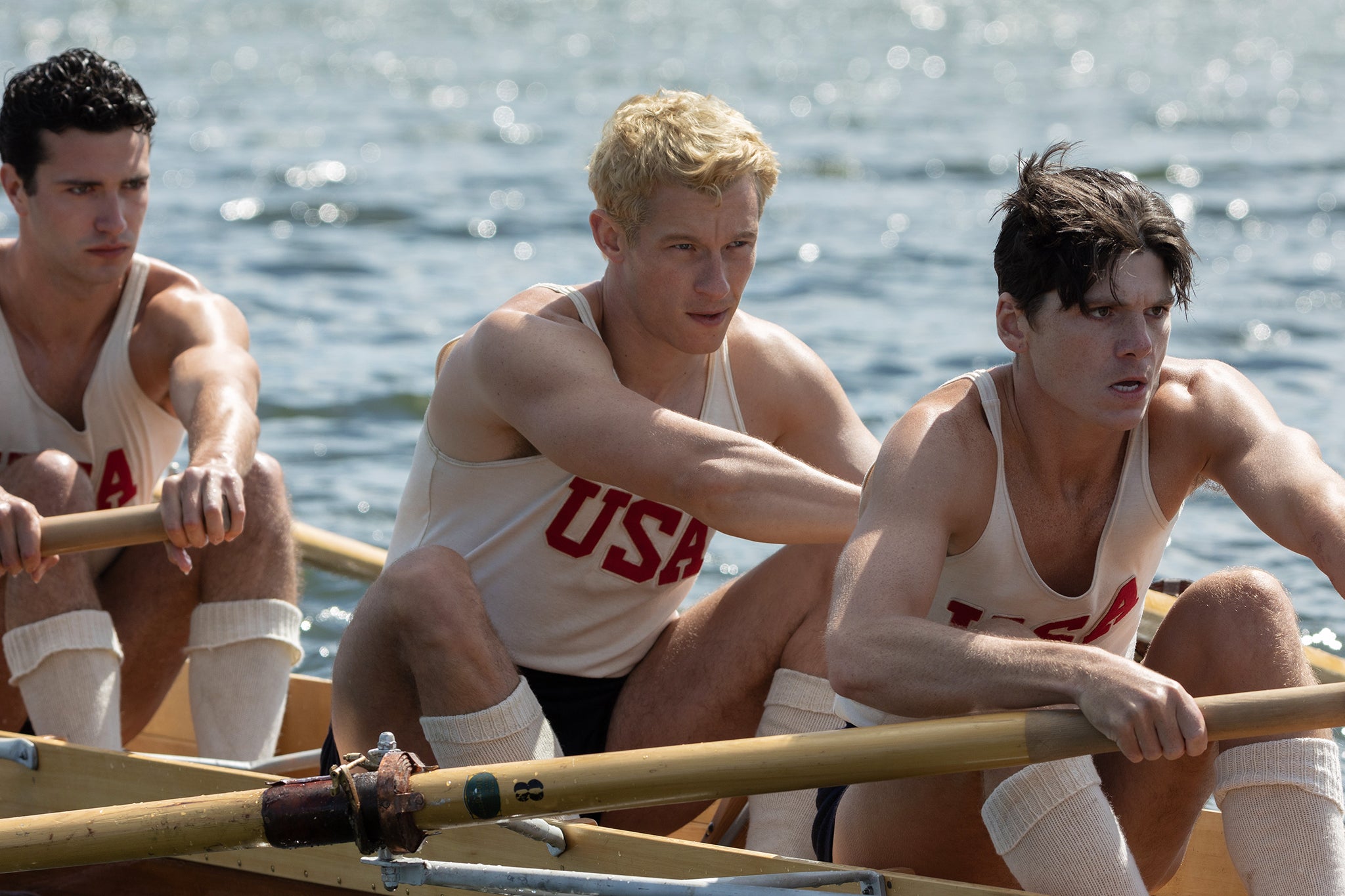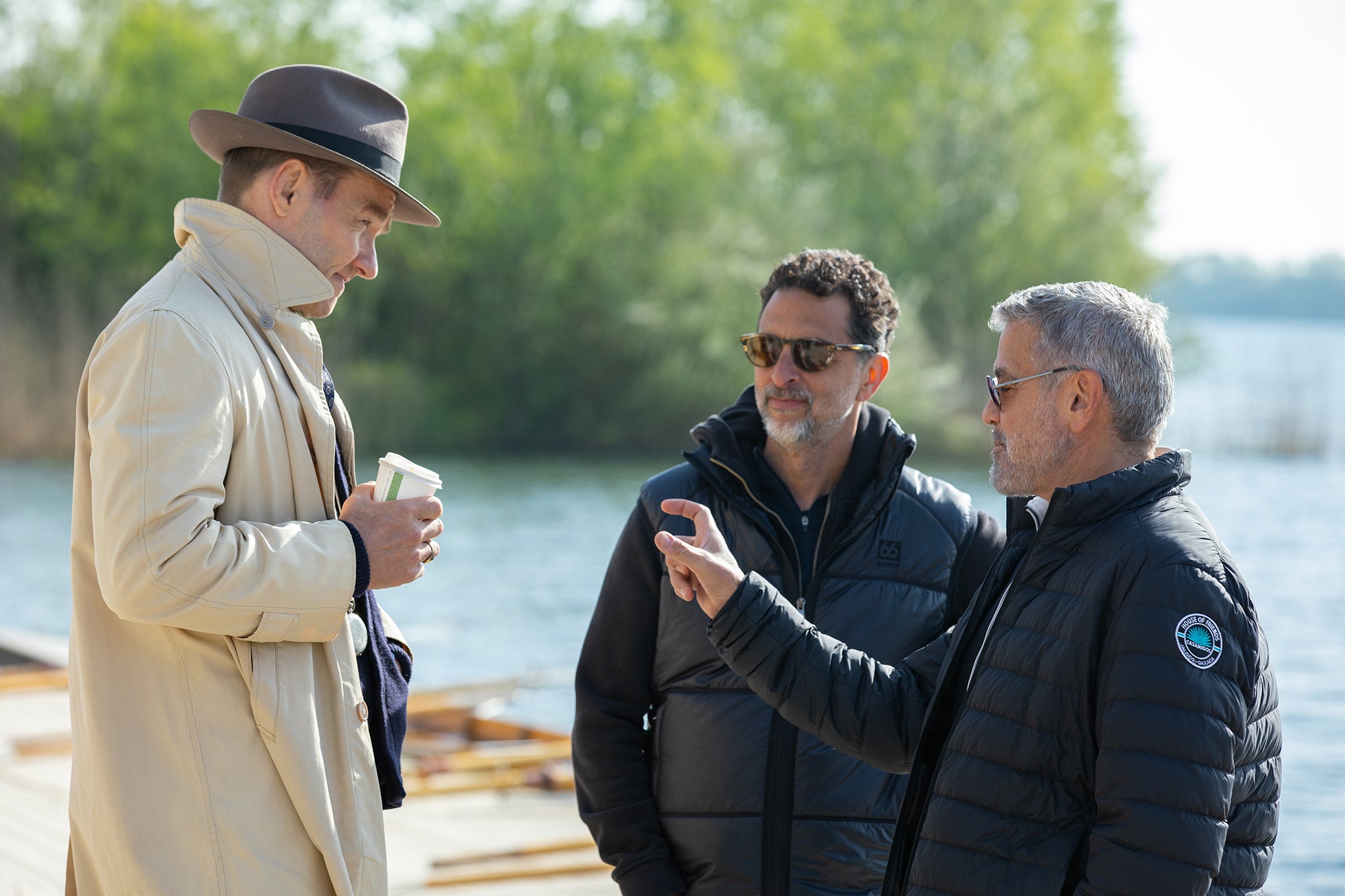The Boys in the Boat is George Clooney’s take on old-fashioned heroism – is that so wrong?
Critics have laid into the actor/filmmaker’s new movie, about the US rowing team who struck gold at Hitler’s Berlin Olympics in 1936. But this is a film with heart and pluck, bearing echoes of ‘Chariots of Fire’, writes Geoffrey Macnab – audiences should embrace it rather than sneer

In recent weeks, several critics have been trying their best to torpedo The Boys in the Boat. George Clooney’s new feature as a director, about the men’s eight rowing team that won gold for the US at the 1936 “Hitler” Berlin Olympics, has faced widespread dismissal: “staid,” “predictable” and “painstakingly wholesome” are among the criticisms.
“This feels like an animatronic museum display,” complained The Guardian. “George Clooney catches a crab with this ruthlessly shallow rowing drama,” wrote The Telegraph when it dipped its oar into the discussion. Clooney’s crime, it seems, is to have made a period drama about the triumph of plucky underdogs in an era when audiences simply can’t take such stories seriously. Or that this kind of storytelling is just too hopelessly old-fashioned. The question, though, is whether these tepid responses reveal more about their own prejudices than about any shortcomings in the film itself.
The Boys in the Boat is adapted from the best-selling non-fiction novel by Daniel James Brown. Its hero Joe Rantz (Callum Turner) is a kid from the wrong side of the tracks in Depression-era America, who overcomes hardship and family misfortune to secure his place on the University of Washington crew. He and the other rowers are coached by the martinet outsider Al Ulbrickson (Joel Edgerton), a gruff, taciturn man who becomes a father figure to the boys. Everybody sneers at these blue-collar types. The Ivy League colleges are appalled that a team of ragamuffins will represent the US at the Olympics. The Nazi Germans are convinced they’ll swat the upstart Yanks aside. The boys don’t even have enough money to pay for their trip to Europe. Joe, meanwhile, is battling the usual inner demons springing from his impoverished and troubled background.
You’ll feel as if you have watched this film many times before – but that is what Clooney intended. “You know, these guys actually rowed out of necessity,” he has explained. “They were broke, they were hungry… they rowed to get food. You put together a group of men who actually could be good enough to win the Olympics.”
For obvious reasons, The Boys in the Boat has been widely compared to Hugh Hudson’s British Oscar-winner Chariots of Fire (1981). Hudson’s film was set during the Paris 1924 Olympics and similarly celebrated the feats of athletes who overcame turmoil in their private lives. Both movies start in the present day, showing their protagonists as old men, before racing back in time to reveal them in their glory days.
In Chariots, Eric Liddell (Ian Charleson), the dour young Scottish athlete, is forbidden by his religion from running on Sundays – and that is precisely when the 100-metre sprint is being held. His teammate Harold Abrahams (Ben Cross) is Jewish and faces persistent antisemitism. He is also criticised for using a professional coach. Both men nonetheless find ways to win. “The endeavours in the film – what the characters are trying to achieve – have a strong moral purpose,” Hudson told me in 2012, shortly before the London Olympics.
That is not a slogan you would ever put on the posters. Movies have rarely been sold on the basis of their moral messages, and yet audiences were strongly drawn to Chariots of Fire because of their admiration for the way that Liddell and Abrahams stuck to their beliefs. “The film doesn’t shout at you, but its values are well located,” its producer David Puttnam later said. “It sounds pretentious but I really believe after you’ve watched it, you feel, momentarily, like a better person.”

Forty years on from the film’s enormous success, some argue that the cultural climate has changed. “Remember Chariots of Fire?” asked Variety in its review of The Boys in the Boat. “In 1982, it won the Oscar for best picture. Today, it wouldn’t win dog-catcher.”
Could Chariots of Fire be made today? Who would be interested in a picture about a Scottish missionary who refuses to run on Sundays? The irony, though, is that many viewers are still drawn to just these stories – and that’s why The Boys in the Boat is nevertheless finding its champions. Although reviewers have been equivocal at best, the film has remained afloat on the back of strong public approval (it currently has a Rotten Tomatoes audience score of 96 per cent, higher than that for Oppenheimer or Wonka).
No one is expecting Clooney, like the boat crew coming from behind to win its gold medal, to make a late run at the Oscars – but his film has at least been doing steady business at the box office. It has made around $25m (£19m) in the US alone, and ought to eventually turn a modest profit on its reported $40m (£30m) budget. The movie has also ignited a debate about whether there is still a place in contemporary cinema for old-fashioned dramas about heroism and sporting triumph. Its admirers have praised the elements that other reviewers have ridiculed. “Boy, do we need it now,” enthused ABC, which hailed Clooney’s celebration of “integrity in the form of human decency”. Its reviewer, however, did also speculate that “probably none of the cool kids would want to see it”.
George understood what the heart of the story was. It reminds us of what we are capable of when we pull together
That’s the rub. Films about wholesome, hard-working heroes overcoming the odds have always seemed a little dull next to the ones about gangsters, chancers, delinquents and narcissists. Whether they’re watching Minions or Last Tango in Paris, many cinemagoers expect at least a little transgression with their popcorn. There is a natural suspicion when they feel they are being preached at, along with a tendency to regard tasteful costume drama as reactionary.
It’s easy to pick holes in The Boys in the Boat. The female characters are barely more than ciphers, and whereas Brown’s book went into considerable detail about the Nazi propaganda machine at work during the 1936 Olympics, Clooney’s film simply throws in a few swastikas and a couple of shots of legendary Black US sprinter Jesse Owens (Jyuddah Jaymes) at the opening ceremony.
According to Brown, during the 1920s and 1930s, “outstanding oarsmen were lionised in the national press … top sportswriters covered the major regattas. Millions of fans diligently followed their crews’ progress.” That may have been the case, but it’s still hard to shake off our perception that rowing is an elite sport for privileged white folk. Joe is shown early on living in poverty but much of the rest of the movie is set on leafy college campuses a very long way from the bread lines. “George understood what the heart of the story was,” Brown recently said, in defence of Clooney’s directorial choices. “It reminds us of what we are capable of when we pull together.”
It’s a revealing remark. This isn’t a story about a heroic individual. It’s about teamwork. As Brown pointed out, for the eight rowers to work in sync is akin to them all standing on a floating log and hitting “eight golf balls at exactly the same moment, with exactly the same amount of force, directing the ball to exactly the same point on a green, and doing so over and over, every two or three seconds”.

Clooney doesn’t labour the point but The Boys in the Boat seems intended as an anti-Marvel movie. It doesn’t have superheroes performing spectacular feats. Instead, its protagonists are young men from impoverished backgrounds, rowing their way out of the Depression and toward better lives. We know from the start that Joe and the rest of the Washington crew are bound to win the gold medal. They offer an idealised vision of what ordinary, decent Americans can achieve when they work together. “It’s kind of a miracle but it’s all out of necessity,” Clooney has said.
The Boys in the Boat is maudlin and manipulative. It is also heartfelt and well crafted. The filmmakers are pulling against contemporary cultural currents by approaching their material in such a straightforward way, without hiding behind irony or satire. It’s easy to forget that many felt Chariots of Fire was anachronistic and very old-fashioned in 1981 – and yet it still went on to win the Best Picture Oscar. Clooney’s film won’t do likewise but it offers a similar opportunity for viewers to forget their cynicism and take its Cinderella-like story of sporting glory at face value.
‘The Boys in the Boat’ is in cinemas from 12 January
Join our commenting forum
Join thought-provoking conversations, follow other Independent readers and see their replies
Comments
Bookmark popover
Removed from bookmarks